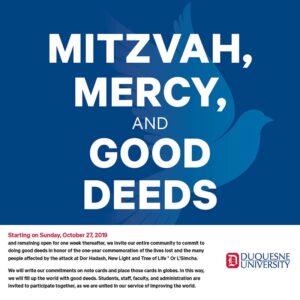‘Mitzvah, Mercy and Good Deeds’ to Commemorate Lives Lost, Those Affected by Anti-Semitic Attack
A collaboration between Spiritan Campus Ministry and the School of Law is providing campus an opportunity to recognize the one-year commemoration of the anti-Semitic attack on the Dor Hadash, New Light and Tree of Life * Or L’Simcha congregations in Squirrel Hill in October 2018.
 Mitzvah, Mercy and Good Deeds, slated from Sunday, Oct. 27, through Sunday, Nov. 3, calls upon Duquesne faculty, staff and students to commit to doing good deeds in honor of the lives that were lost and the many affected by the attack. Individuals are invited to write down their commitment on a note card and place it into “globes” that will be placed in the Union, Hogan Dining in Towers, Gumberg Library, the law school and the University Chapel.
Mitzvah, Mercy and Good Deeds, slated from Sunday, Oct. 27, through Sunday, Nov. 3, calls upon Duquesne faculty, staff and students to commit to doing good deeds in honor of the lives that were lost and the many affected by the attack. Individuals are invited to write down their commitment on a note card and place it into “globes” that will be placed in the Union, Hogan Dining in Towers, Gumberg Library, the law school and the University Chapel.
Last year, Assistant Law Professor Seth Oranburg worked with the Spiritans to put together an introspective Interfaith Prayer Service hosted by the University just days after the attack.
“That first session was full of mourning. Yet, today, we look back on those events from one year ago with a new perspective,” Oranburg said. “Our year of prayer and preparation led us to participation and performance today. Last year, we reflected on a tragedy. Now—in honor of those whose lives were lost—we will take action to prevent another one.”
Mitzvah, Mercy and Good Deeds is a simple concept that melds Jewish and Catholic notions of kindness, according to the Rev. Bill Christy, C.S.Sp., director of Spiritan Campus Ministry and University chaplain.
“In the Catholic context, the works of mercy invite grace into the world. And I believe that that would be very much true of mitzvah, that these good works that we do are a continuation of our participation in God’s creation,” Christy said. “They do meld together very well, these ideas that our actions in the world really do count and really do make a world in which goodness can be actualized.”
Regarding the theme or name of this initiative, the word “mitzvah” describes an individual act of human kindness or good that is defined as that which the creator of the universe wants done with his universe. By doing that, we are bound up with him in body, mind and soul.
Works of mercy are practices that bring merit and goodness in Christian ethics. Popular in the Catholic Church as an act of both penance and charity, works of mercy are a means of grace which lead to holiness and aid in sanctification.
Good deeds are when one offers or performs intuitively an act of compassion, unconditional love, understanding, kindness, volunteering, help, listening to or support to a family member or a person in your community.
